Table of contents
As a software startup, the Turnkey Office Space team must spend their digital marketing budget wisely if they want to meet aggressive growth goals.
Edward Klaynberg and Jon Bachrach, founders of Turnkey Office Space, face a daunting marketing challenge.
Since they work with a nationwide network of co-working spaces, they must acquire leads for potential lessees in over 20 major cities and hundreds of smaller ones. At the same time, they need to continually invite new co-working spaces across the country to join their network.
The two founded Turnkey together in 2013. Today, they are a small team looking for rapid growth. So, in addition to sales and marketing efforts, they manage a team of contractors that help with the rest of the business.
Alongside an SEO consultant and content agency, they must quickly identify their high-performing marketing channels if they want to grow into a larger company. They do not have time to work across all marketing channels. Instead, they must utilize 1-3 high performing channels and make sure they convert that traffic at a sufficient rate.
Before using Databox, they monitored Google Analytics manually.
“We would log in to Google Analytics and just leave the tab open. We would check back into it every couple days. It was always hard to find the specific metrics we wanted to track. There is so much information in Google Analytics and it is hard to find what you are looking for.”
 Jon Bachrach
Jon Bachrach
Founder, COO
Now, Jon and Edward use Databox to track their Google Analytics data in real-time. They can easily explore the metrics that drive their business, and decide which marketing initiatives need more resources. Additionally, they monitor other key systems that determine the health of their business, like Quickbooks.
Here is the full strategy they use to make data-driven marketing decisions.
The Company
Turnkey Office Space was launched in 2013 by two native New Yorkers with the passion and experience to create a helpful service in an exciting growth industry. Ed has many years of experience developing websites and working on key development projects in the New York City area as a real estate broker. Jon has over 5 years of experience in the e-brokerage industry, giving him intricate knowledge and understanding of the industry.
Edward says they have had ambitions to start a company together for a long time. “I’ve known Jon since middle school. We went to school together in New York City. We had always wanted to start a website. The opportunity just presented itself. Jon opened my eyes to the market for coworking space.”
Together they created Turnkey Office Space, a service that aspires to provide the ultimate office booking experience. Across the United States, small companies of 1-10 people (or small teams within companies) are looking for furnished office space with flexibility. They would normally approach one of the big companies in the co-working industry, like Regus or WeWork, and review whatever space is available.
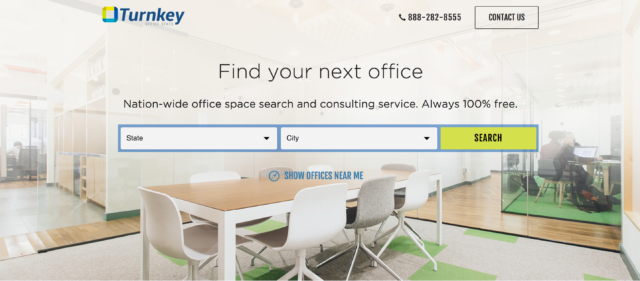
Instead, Turnkey maintains a network of co-working spaces across hundreds of cities in the US. These include the well-known coworking spaces as well as niche, independent spaces that cater to specific needs and industries. When teams and companies come to Turnkey, they get specific recommendations for space that fits their requirements. Jon and Ed can set them up with as many as 5 tours within an hour. And, it is free for these prospective tenants.
Turnkey has a classic online marketplace model.
Supply-side: They must convince coworking spaces to join their network. This is a pretty easy ask, because Jon and Ed are really asking for permission to forward qualified leads.
Demand-side: Turnkey must get the word out about their service to potential lessees before they automatically choose one of the big names in the industry or give up due to the difficulty of finding a space.
The Challenge
From a business perspective, Turnkey must find a way to get their service in front of potential lessees at a reasonable price. They need to keep the cost per lead low.
In terms of marketing, they need to answer the following questions:
- Where are people actively looking for flexible coworking space?
- What information do site visitors need to see in order to trust us?
- Which cities are the most popular?
Google Analytics may be a good start for these questions, but then they need to connect this marketing data to other parts of their business. For example, if they want to find their most valuable city, they need to look at lead and customer data from their CRM. If they want to decide how to reallocate marketing budget, they need to look at Quickbooks to see what they can afford.
“We had different dashboards for each service. If we wanted to see Quickbooks data, we would go in there. If we wanted to see CRM data, we would go in there. We are trying to consolidate this data so we can quickly get a snapshot of our company. We had a lot of scattered dashboards across different websites.”
 Edward Klaynberg
Edward Klaynberg
CEO, Founder
Options for Marketing Strategies
Turnkey has 3 main options for acquiring qualified traffic. All center around one fundamental assumption: People commonly search for coworking space via a Google search. Organic search ranking and PPC ads are the two top ways to capitalize on this.
1- Pay-per-click (PPC) ads
Let’s say that a potential lead searched Google with the term “coworking space Seattle”. There is a great chance that this person is actively looking to tour their next office. Turnkey could create an ad around their unique selling proposition- comparison shopping and ability to discover spaces that you may not find otherwise.
2- Content marketing
Turnkey wants to be a trusted advisor in the leasing process. They could create blogs, whitepapers and videos around common challenges that small companies and remote teams face in the leasing process. If potential leads discover them via this content, Turnkey has already communicated unique value that they will not receive anywhere else.
3- Landing pages
Let’s say that someone Googles “coworking space Houston”. Turnkey can build landing pages targeted at specific markets, like this:
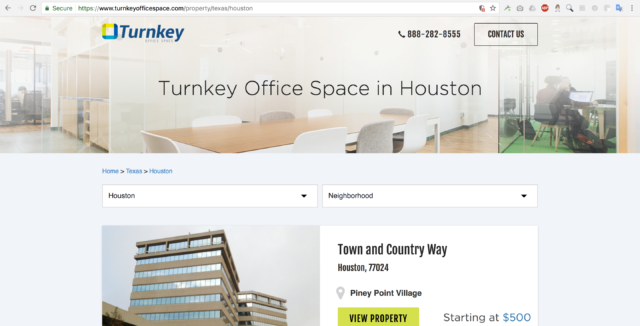
And they can go even more specific with pages for each individual space:
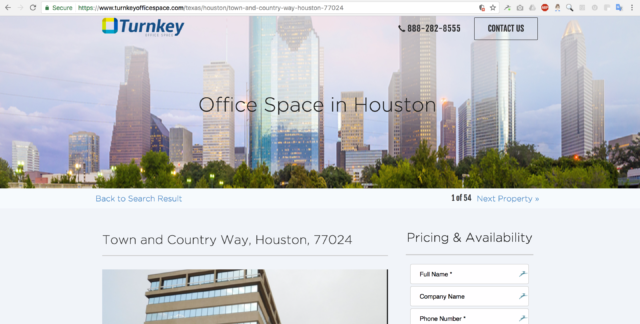
This is currently their most successful strategy.
“You can see which pages people are on and which forms get filled out. The majority of people are filling out the forms on property pages and calling in.”
 Jon Bachrach
Jon Bachrach
Founder, COO
How They Use Real-Time Dashboards
Turnkey monitors the following systems:
![]() Google Analytics
Google Analytics
![]() Quickbooks
Quickbooks
![]() Drupal-based CRM
Drupal-based CRM
![]() Drip Email Automation
Drip Email Automation
![]() Linkedin
Linkedin
![]() Twitter
Twitter
![]() Facebook
Facebook
![]() Instagram
Instagram
They currently have 7 Databoards set up:
- 2 for Google Analytics (user data and insights, user trends, top sources, top organic keywords),
- 2 for CRM data tracking via the MySQL connector (lead statuses and property activity),
- 1 for social accounts (Twitter Facebook, LinkedIn, Instagram),
- 1 for measuring Google Analytics for other websites that we have created,
- 1 for our Quickbooks (monitoring income, expenses and invoices)
They track data on mobile, desktop and TV. They use an Asus Chromebit for the TV.
“We are a web-based service and it is important for us to be constantly aware of user activity on our websites. Having our data conveniently displayed on different boards on a TV monitor that we have set up in our office has allowed us to spot trends, ratios and activity that we otherwise would not have noticed. We have been able to tweak and modify our marketing strategy based on these real time figures.”
 Edward Klaynberg
Edward Klaynberg
CEO, Founder
Recommended Dashboard: Google Analytics Acquisition Snapshot
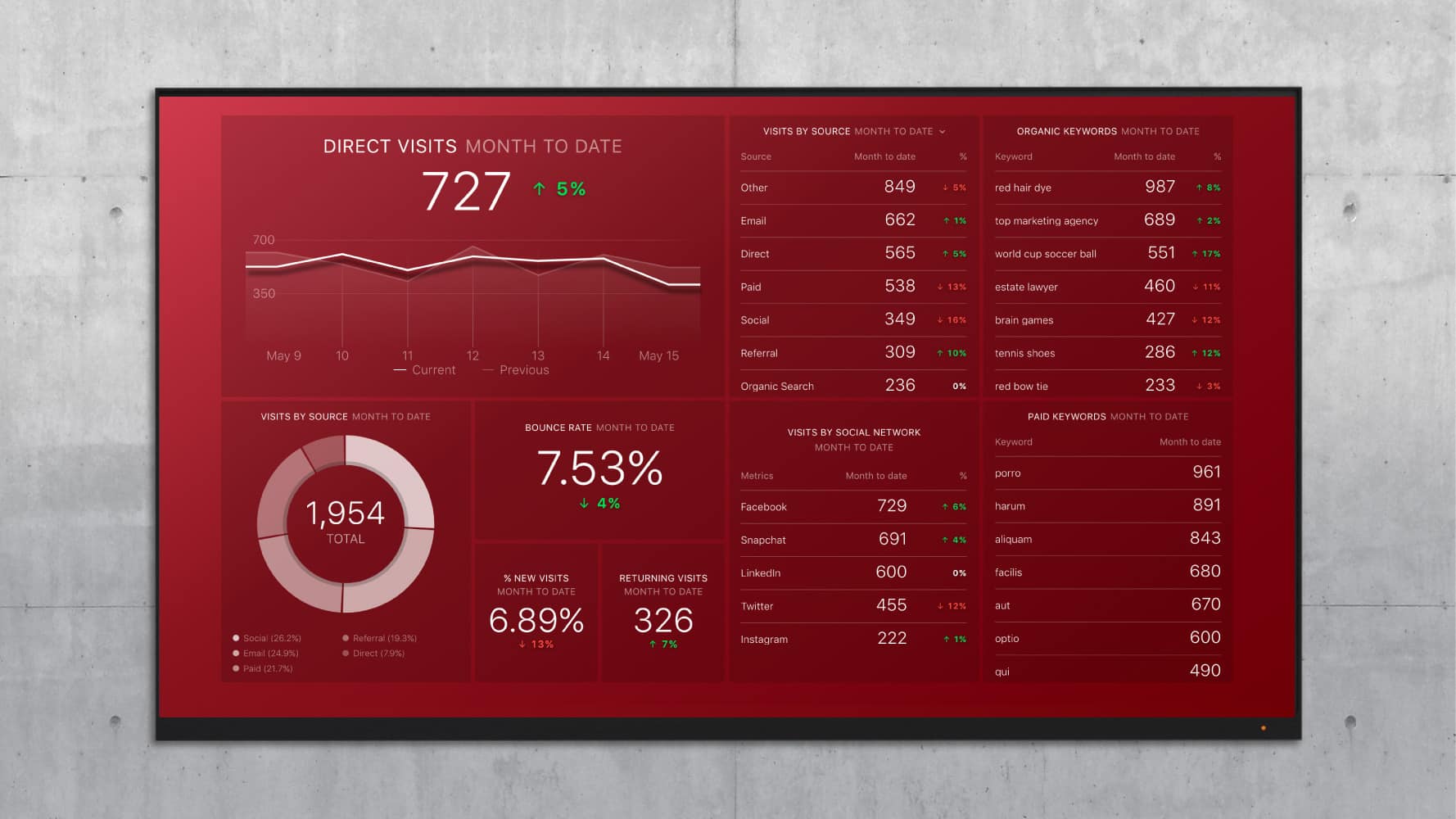
Key Metrics They Monitor
Turnkey currently focuses on website traffic and compares daily numbers to previous days, weeks and months. They look at user behavior metrics such as:
- Bounce rates
- Average session duration
- % new users
They also use Goals to track their user count so that they can clearly see if they are on pace to meet monthly numbers.
Future Ideas
They will soon add impressions, clicks and CTR from organic search traffic via our Google Search Console integration. They want to see which terms are driving the most traffic in order to double down on specific markets.
In the future, they also want to get more results from content marketing. Since they work with a content agency, they are planning to use the Blog Quality Metrics dashboard to review each piece of content and decide where they need to focus more effort.
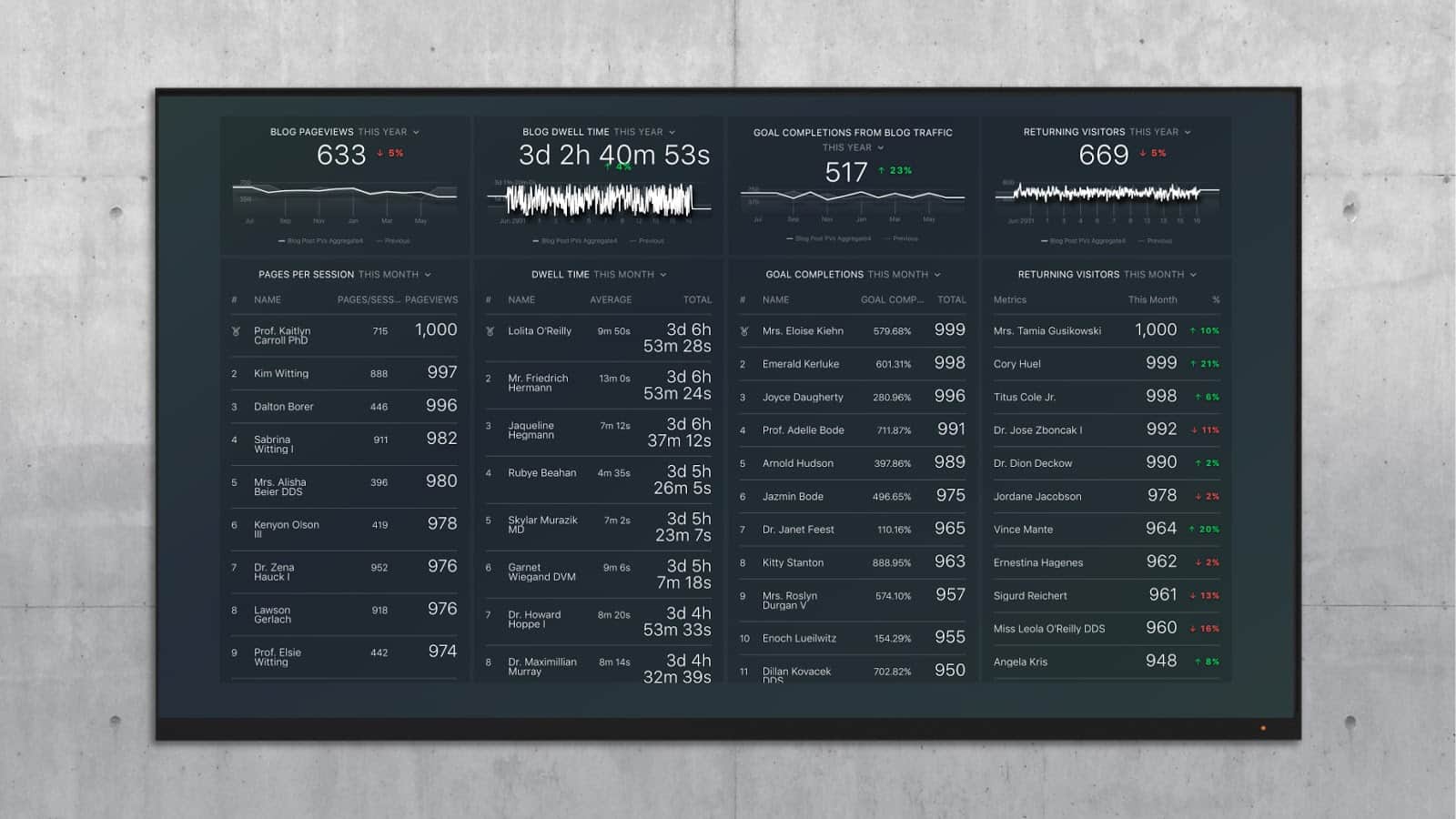
For example, if posts around “scenic coworking space” generate more page visits, read time and goal completions, they can write more posts about scenic coworking spaces in each market.
Make More Data-Driven Marketing Decisions
Obviously, we recommend that every business set up processes that allow them to make real-time marketing decisions. Even if you don’t have the budget constraints of a startup, you still don’t want a nasty surprise at the end of the month when you realize your marketing budget trickled away and you did not get the results that you needed.
If you want to set up real-time dashboards at your business, here is a 5-step framework that can get you started immediately:
- Select the services that contain your key marketing metrics.
- Decide on a few metrics to measure marketing success. Turnkey chose traffic and quality metrics like bounce rate and session duration.
- Find a real-time tool that tracks these metrics. At Databox, we integrate with 50+ digital services.
- Determine who needs access to this data. Should it be on a TV in your office? Should your boss have constant access?
- Set up a weekly or biweekly review process to ensure that your team acts on the real-time data
If Databox has the integrations you need, set up a free account today.














